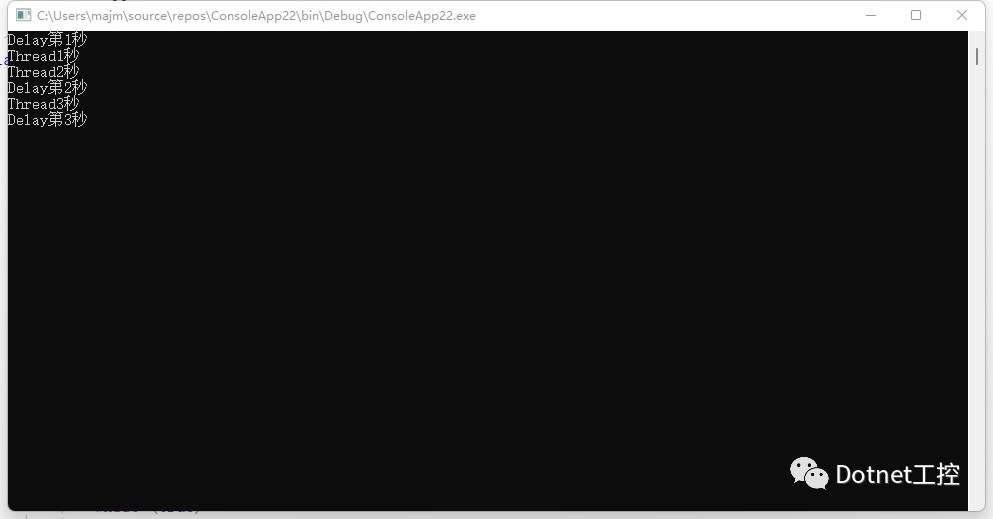很多时候我们需要做一段延时处理,就直接Thread.Sleep(n)处理了,但实际上延时也可以用Task.Delay(n),那二者之间有没有区别呢?
我们先来看一个案例:.
using System;using System.Threading;using System.Threading.Tasks;namespace ConsoleApp22{class Program{static void Main(string[] args){//Good writingTask.Run(async () =>{int delayTimeCount = 0;while (true){Console.WriteLine($"Delay第{++delayTimeCount}秒");await Task.Delay(1000);}});//Bad writingTask.Run(() =>{int sleepTimeCount = 0;while (true){Console.WriteLine($"Thread{++sleepTimeCount}秒");Thread.Sleep(1000);}});Console.ReadKey();}}}
运行结果:

区别:
①.Thread.Sleep()是同步延迟,既然是同步的,自然会阻塞当前线程;Task.Delay()是异步延迟,则不会阻塞线程;
②.Thread.Sleep()不能中途取消,Task.Delay()可以,delay有四个重载方法,需要取消的话,可以调用Delay(int millisecondsDelay, CancellationToken cancellationToken)这个方法;
//// 摘要:// Creates a task that completes after a specified number of milliseconds.//// 参数:// millisecondsDelay:// The number of milliseconds to wait before completing the returned task, or -1// to wait indefinitely.//// 返回结果:// A task that represents the time delay.//// 异常:// T:System.ArgumentOutOfRangeException:// The millisecondsDelay argument is less than -1.public static Task Delay(int millisecondsDelay);//// 摘要:// Creates a cancellable task that completes after a specified number of milliseconds.//// 参数:// millisecondsDelay:// The number of milliseconds to wait before completing the returned task, or -1// to wait indefinitely.//// cancellationToken:// A cancellation token to observe while waiting for the task to complete.//// 返回结果:// A task that represents the time delay.//// 异常:// T:System.ArgumentOutOfRangeException:// The millisecondsDelay argument is less than -1.//// T:System.Threading.Tasks.TaskCanceledException:// The task has been canceled.//// T:System.ObjectDisposedException:// The provided cancellationToken has already been disposed.public static Task Delay(int millisecondsDelay, CancellationToken cancellationToken);//// 摘要:// Creates a task that completes after a specified time interval.//// 参数:// delay:// The time span to wait before completing the returned task, or TimeSpan.FromMilliseconds(-1)// to wait indefinitely.//// 返回结果:// A task that represents the time delay.//// 异常:// T:System.ArgumentOutOfRangeException:// delay represents a negative time interval other than TimeSpan.FromMilliseconds(-1).// -or- The delay argument's System.TimeSpan.TotalMilliseconds property is greater// than System.Int32.MaxValue.public static Task Delay(TimeSpan delay);//// 摘要:// Creates a cancellable task that completes after a specified time interval.//// 参数:// delay:// The time span to wait before completing the returned task, or TimeSpan.FromMilliseconds(-1)// to wait indefinitely.//// cancellationToken:// A cancellation token to observe while waiting for the task to complete.//// 返回结果:// A task that represents the time delay.//// 异常:// T:System.ArgumentOutOfRangeException:// delay represents a negative time interval other than TimeSpan.FromMilliseconds(-1).// -or- The delay argument's System.TimeSpan.TotalMilliseconds property is greater// than System.Int32.MaxValue.//// T:System.Threading.Tasks.TaskCanceledException:// The task has been canceled.//// T:System.ObjectDisposedException:// The provided cancellationToken has already been disposed.public static Task Delay(TimeSpan delay, CancellationToken cancellationToken);
③在异步代码中通常使用await关键字调用Task.Delay(),而不是Thread.Sleep();
